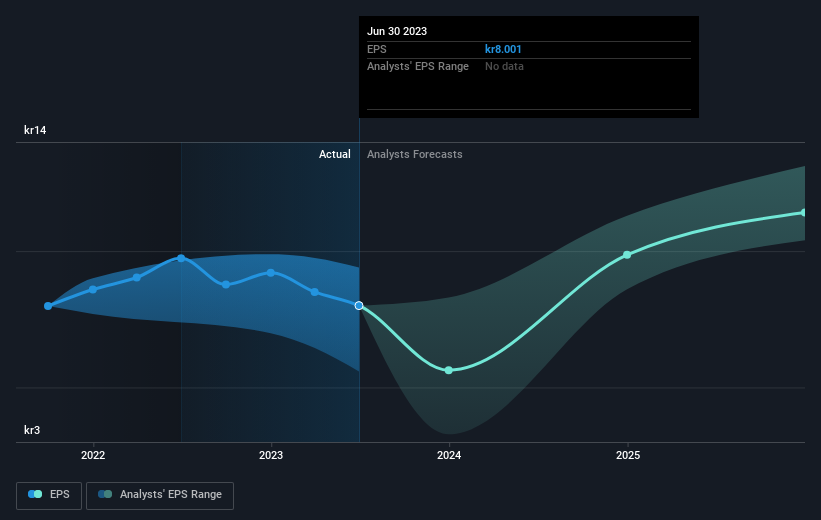- Sweden
- /
- Commercial Services
- /
- OM:SECU B
Securitas (STO:SECU B) earnings and shareholder returns have been trending downwards for the last five years, but the stock rallies 5.0% this past week

For many, the main point of investing is to generate higher returns than the overall market. But the main game is to find enough winners to more than offset the losers At this point some shareholders may be questioning their investment in Securitas AB (publ) (STO:SECU B), since the last five years saw the share price fall 43%. On the other hand the share price has bounced 5.0% over the last week.
While the stock has risen 5.0% in the past week but long term shareholders are still in the red, let's see what the fundamentals can tell us.
See our latest analysis for Securitas
To paraphrase Benjamin Graham: Over the short term the market is a voting machine, but over the long term it's a weighing machine. One flawed but reasonable way to assess how sentiment around a company has changed is to compare the earnings per share (EPS) with the share price.
During the five years over which the share price declined, Securitas' earnings per share (EPS) dropped by 0.2% each year. Readers should note that the share price has fallen faster than the EPS, at a rate of 11% per year, over the period. So it seems the market was too confident about the business, in the past. The low P/E ratio of 10.88 further reflects this reticence.
The image below shows how EPS has tracked over time (if you click on the image you can see greater detail).

We consider it positive that insiders have made significant purchases in the last year. Even so, future earnings will be far more important to whether current shareholders make money. This free interactive report on Securitas' earnings, revenue and cash flow is a great place to start, if you want to investigate the stock further.
What About Dividends?
As well as measuring the share price return, investors should also consider the total shareholder return (TSR). The TSR incorporates the value of any spin-offs or discounted capital raisings, along with any dividends, based on the assumption that the dividends are reinvested. So for companies that pay a generous dividend, the TSR is often a lot higher than the share price return. We note that for Securitas the TSR over the last 5 years was -20%, which is better than the share price return mentioned above. This is largely a result of its dividend payments!
A Different Perspective
Securitas shareholders have received returns of 9.2% over twelve months (even including dividends), which isn't far from the general market return. The silver lining is that the share price is up in the short term, which flies in the face of the annualised loss of 4% over the last five years. We're pretty skeptical of turnaround stories, but it's good to see the recent share price recovery. While it is well worth considering the different impacts that market conditions can have on the share price, there are other factors that are even more important. For instance, we've identified 3 warning signs for Securitas (2 are significant) that you should be aware of.
There are plenty of other companies that have insiders buying up shares. You probably do not want to miss this free list of growing companies that insiders are buying.
Please note, the market returns quoted in this article reflect the market weighted average returns of stocks that currently trade on Swedish exchanges.
New: Manage All Your Stock Portfolios in One Place
We've created the ultimate portfolio companion for stock investors, and it's free.
• Connect an unlimited number of Portfolios and see your total in one currency
• Be alerted to new Warning Signs or Risks via email or mobile
• Track the Fair Value of your stocks
Have feedback on this article? Concerned about the content? Get in touch with us directly. Alternatively, email editorial-team (at) simplywallst.com.
This article by Simply Wall St is general in nature. We provide commentary based on historical data and analyst forecasts only using an unbiased methodology and our articles are not intended to be financial advice. It does not constitute a recommendation to buy or sell any stock, and does not take account of your objectives, or your financial situation. We aim to bring you long-term focused analysis driven by fundamental data. Note that our analysis may not factor in the latest price-sensitive company announcements or qualitative material. Simply Wall St has no position in any stocks mentioned.
About OM:SECU B
Securitas
Provides security services in North America, Europe, Latin America, Africa, the Middle East, Asia, and Australia.
Solid track record, good value and pays a dividend.
Similar Companies
Market Insights
Community Narratives


